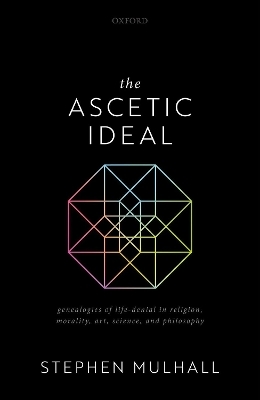
The Ascetic Ideal
Genealogies of Life-Denial in Religion, Morality, Art, Science, and Philosophy
Seiten
2021
Oxford University Press (Verlag)
978-0-19-289688-9 (ISBN)
Oxford University Press (Verlag)
978-0-19-289688-9 (ISBN)
Stephen Mulhall traces the development of an ideal of asceticism through Western culture. He shows how influential this self-denying attitude to life has been not just in religion and morality but in aesthetics, science, and philosophy. And he illuminates the role of the ascetic ideal in the thought of Nietzsche, who introduced the concept.
In The Ascetic Ideal, Stephen Mulhall shows how areas of cultural life that seem to be either essentially unconnected to evaluative commitments (science and philosophy) or to involve non-moral values (aesthetics) are in fact deeply informed by ethico-religious commitments, for better and for worse.
The book develops a reading of Nietzsche's concept of 'the ascetic ideal', which he used to track the evolution, mutation, and expansion of the system of slave moral values, associated primarily with Judaeo-Christian religious belief through diverse fields of Western European culture--not just religion and morality, but aesthetics, science, and philosophy. Mulhall also offers an interpretation of Nietzsche's genealogical method that aims to rebut standard criticisms of its nature, and to emphasize its potential for enhancing philosophical understanding more generally.
The focus throughout is on developments in those fields which occurred after the end of Nietzsche's intellectual career, and in particular on influential modes of thought and practice that have a contemporary significance. The goal is not simply to argue that Nietzsche's diagnosis and critique retains considerable merit, but also to show that Nietzsche is himself significantly indebted to the ideals he criticizes, and that this opens up a possibility of synthesizing elements of his approach with those drawn from its target. Hence, the book also tracks various ways in which the object of Nietzsche's criticism has undergone further mutations (just as his genealogical method would suggest), and in doing so has generated ways of pursuing the values central to asceticism that avoid Nietzsche's criticisms, and might even further his own goals.
In The Ascetic Ideal, Stephen Mulhall shows how areas of cultural life that seem to be either essentially unconnected to evaluative commitments (science and philosophy) or to involve non-moral values (aesthetics) are in fact deeply informed by ethico-religious commitments, for better and for worse.
The book develops a reading of Nietzsche's concept of 'the ascetic ideal', which he used to track the evolution, mutation, and expansion of the system of slave moral values, associated primarily with Judaeo-Christian religious belief through diverse fields of Western European culture--not just religion and morality, but aesthetics, science, and philosophy. Mulhall also offers an interpretation of Nietzsche's genealogical method that aims to rebut standard criticisms of its nature, and to emphasize its potential for enhancing philosophical understanding more generally.
The focus throughout is on developments in those fields which occurred after the end of Nietzsche's intellectual career, and in particular on influential modes of thought and practice that have a contemporary significance. The goal is not simply to argue that Nietzsche's diagnosis and critique retains considerable merit, but also to show that Nietzsche is himself significantly indebted to the ideals he criticizes, and that this opens up a possibility of synthesizing elements of his approach with those drawn from its target. Hence, the book also tracks various ways in which the object of Nietzsche's criticism has undergone further mutations (just as his genealogical method would suggest), and in doing so has generated ways of pursuing the values central to asceticism that avoid Nietzsche's criticisms, and might even further his own goals.
Stephen Mulhall is a Professor of Philosophy, and Fellow of New College, University of Oxford. He was previously a Reader in Philosophy at the University of Essex, and a Prize Fellow of All Souls College, Oxford. He received an MA in Philosophy from the University of Toronto, and a DPhil in Philosophy from the University of Oxford.
Introduction
Essay One: Authority and Revelation
Essay Two: Writing the Life of the Mind
Essay Three: Knowing, Framing, and Enframing
| Erscheinungsdatum | 04.10.2021 |
|---|---|
| Verlagsort | Oxford |
| Sprache | englisch |
| Maße | 161 x 242 mm |
| Gewicht | 626 g |
| Themenwelt | Geisteswissenschaften ► Philosophie ► Ethik |
| ISBN-10 | 0-19-289688-1 / 0192896881 |
| ISBN-13 | 978-0-19-289688-9 / 9780192896889 |
| Zustand | Neuware |
| Informationen gemäß Produktsicherheitsverordnung (GPSR) | |
| Haben Sie eine Frage zum Produkt? |
Mehr entdecken
aus dem Bereich
aus dem Bereich


